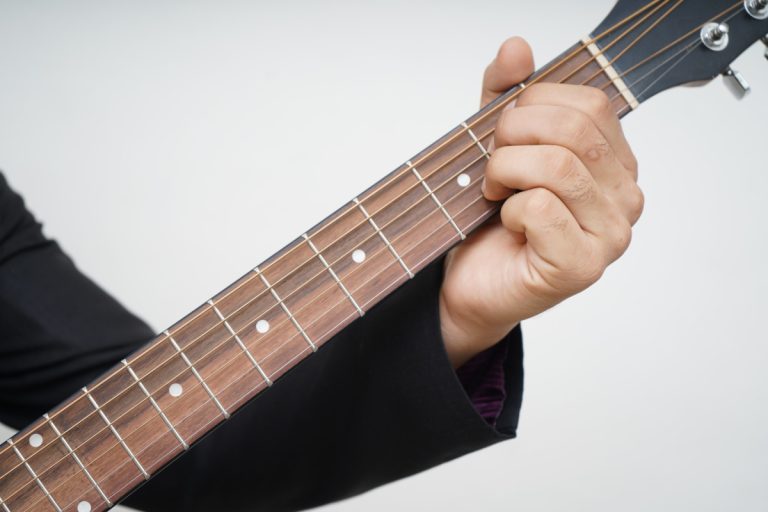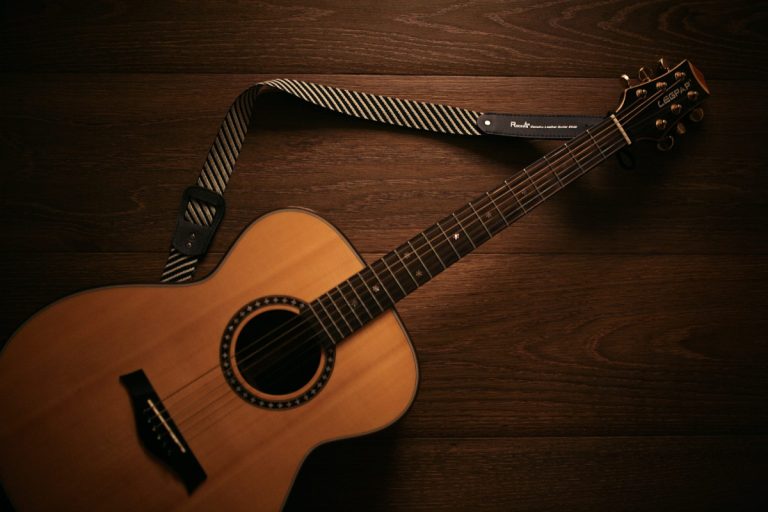Are you tired of the same old sound coming from your guitar? Are you unsure if you should string your acoustic with steel or nylon strings?
Well, you’re in luck because, in this article, we’ll dive into the world of guitar strings and compare these two most popular types.
As a guitarist, choosing the right strings for your guitar can be a game-changer, whether you’re a beginner or a seasoned pro.
So, get ready to learn everything you need about nylon and steel strings and take your playing to the next level. Don’t miss out on this opportunity to elevate your sound and skills!
Characteristics of Nylon Guitar Strings
If you’re considering playing a nylon-string guitar, it’s important to understand the unique characteristics of these strings. Here are some key features of nylon guitar strings:
Softer sound
Nylon strings produce a warmer, softer sound compared to steel strings. This makes them ideal for classical, flamenco, and fingerstyle guitar playing.
Gentle on fingers
Nylon strings are easier on your fingers than steel strings. They don’t dig into your fingertips as much, which can be a relief for beginners or those with sensitive skin.
Wider neck
Nylon-string guitars typically have wider necks than steel-string guitars. This can make them more difficult to play if you’re used to playing on a narrower neck, but it also gives you more space between the strings to avoid accidentally muting adjacent strings.
No ball ends
Nylon strings are tied onto the guitar’s bridge rather than held in place by ball ends like steel strings. This can make restringing a bit trickier, but it also means you don’t have to deal with the little balls on the end of your strings.
Which Guitar is a Nylon Guitar String For?
Nylon strings are traditionally used for classical guitars, giving them a distinctive sound and feel that sets them apart from steel string guitars. These guitars are usually smaller and don’t have electronics, cutaways, or fretboard markers.
But don’t worry!
You’ll love the mellow tone and responsiveness of the nylon strings, and the pure nylon treble strings combined with bass strings wrapped in metal will give you a well-balanced sound.
Recommended Nylon Guitar Strings
D’Addario EJ45 Pro-Arte Nylon, Normal Tension Strings
RELIABLE CLASSICAL TONE
Perfect For: live performances, studio recording, and classical guitar playing
Features:
- Provides superb treble string intonation and consistency
- Comes with semi-polished bass strings for a minimal fret noise
- Offers a balance of rich tone, comfortable feel and dynamic projection
Pros:
- Reliable and long-lasting
- Sealed in eco-friendly, anti-corrosion packs
- Considered one of the best nylon guitar strings available
Cons:
- May not be suitable for more aggressive playing styles
The TedScore: 9/10
Ernie Ball Earthwood 2069 Nylon Folk Ball-End Set
FOR PURE AND RICH TREBLE TONES
Perfect For: classical and folk music
Features:
- Ball-end nylon strings that allow for faster installation
- Made of 80/20 copper and zinc to deliver true brass sound
- Ensure optimum performance and long-lasting life
Pros:
- Delivers bright and balanced tones
- Offers optimum performance
Cons:
- Slightly more expensive than other brands
The TedScore: 8/10
Augustine Concert High Tension Strings
BRIGHT AND PUNCHY
Perfect For: classical players
Features:
- Provides higher tension in the bass strings
- Offers an exceptional feel with its quality design
Pros:
- Great and affordable price
- Classy and refined strings made with top-quality
Cons:
- Higher tension strings, so the player needs to press harder on the fretboard
The TedScore: 8/10
Characteristics of Steel Guitar Strings
Steel guitar strings are known for their bright and vibrant sound. They’re the quintessential acoustic guitar sound and are the go-to choice for many guitar players.
More Tension
Steel strings are under more tension than nylon strings, which means they require a greater amount of force to fret notes properly. This can make them more difficult for beginners, but experienced players prefer steel strings for their sound and versatility.
Produce a Wide Range of Tones
Steel-stringed guitars are known for their bright and shimmering sound, perfect for playing lead lines and solos. They’re also great for strumming chords and producing a rich sound. They are versatile enough for various musical genres, from country and folk to rock and pop.
Materials
Steel strings are typically made from a steel core wrapped in various materials, including bronze, phosphor bronze, and nickel. Each of these materials has its unique sound and tone, so choosing the right string type for your playing style and musical preferences is important.
Bronze strings, for example, are known for their warm and mellow sound, while phosphor bronze strings have a brighter and more focused sound.
Which Guitar is a Steel Guitar String For?
Steel strings are designed to go with steel string guitars. These guitars are specifically manufactured to handle the tension and pressure from metal strings, providing the perfect tone, intonation, and playability.
If you’re into country, rock, bluegrass or any other kind of music that requires a bright and crisp sound, steel string acoustic guitars would be a perfect fit. Playing on steel strings might be harder than nylon strings since they require a firmer hand to produce sound, but the extra volume and power they deliver make it all worth it.
Recommended Steel Guitar Strings
Ernie Ball Regular Slinky 2221 Nickel Guitar Strings
THE STANDARD FOR ELECTRIC STRINGS
Perfect For: rock musicians
Features:
- Made of nickel for playing with aggression and passion
- Fresh and ready to play
- Comes in Element Shield packaging which protects them against humidity
- With incredible durability that fights against wear and tear
Pros:
- Promises clear, dynamic sound as well as brilliant robustness
- Provides unwavering quality
- Iconic and has been used by the likes of Eric Clapton, Slash, and John Mayer
Cons:
- Some guitarists have reported that they can lose their tone and feel dull after a few weeks of heavy use
The TedScore: 9/10
D’Addario NYXL Electric Guitar Strings
HEAVY-DUTY REVOLUTIONARY GUITAR STRINGS
Perfect For: all guitarists
Features:
- Constructed from a high-carbon steel core and plain steel alloys
- Made with improved wire drawing processes with a ‘fusion twist’ for the best reliability
Pros:
- Provides increased tuning stability and optimised string strength
- Last longer, sound better, bend further and even hold tunings better
Cons:
- May not be suitable for guitarists who prefer a warmer, vintage-style tone
The TedScore: 8.5/10
GHS Boomers Guitar Strings Light
HIGH-PERFORMANCE STEEL STRINGS
Perfect For: any electric guitar
Features:
- Nickel-plated wrap for durability and longevity
- With a round wound construction to deliver a bright and lively tone
- Made with a precision winding process for consistent performance
Pros:
- Provides an excellent balance between brightness and warmth
- Suitable for a wide range of playing styles and genres
Cons:
- Some guitarists have reported that it can be a bit harsh on their fingers
The TedScore: 7.5/10
Nylon Guitar Strings vs Steel: Key Takeaways
So there you have it! You now know the differences between nylon guitar strings and steel guitar strings. Whether you’re a beginner or a seasoned musician, choosing the right strings for your guitar can make a huge difference in the sound and feel of your playing.
Regardless of which type of string you choose, changing them regularly is important to keep your guitar sounding its best. Over time, strings can become worn and lose their tone, so it’s a good idea to change them every few months or whenever they feel dull or difficult to play.
So go ahead and try out both types of strings and see which one you prefer! Whether you want the crisp, bright tone of steel strings or the softer, warmer sound of nylon strings, the choice is yours.
So pick up your guitar, strum a few chords, and let the music take you away!
Don’t leave just yet!!!
Did this article pique your interest in nylon-string classical guitars? Then, we have something just for you! Check out this article showcasing the top 11 Classical Guitars for Beginners to explore a new world of classical and flamenco music!
FAQ’s
Which guitar string is better nylon or steel?
It depends on your preference and the music you want to play. Nylon strings are typically used for classical and flamenco guitars, while steel strings are commonly used for folk, country, and rock music.
Which is best for beginners nylon or steel string guitar?
As a beginner, you may find nylon strings more comfortable to play with due to their lower tension and softer feel. However, steel strings may be better for playing popular music genres like rock or country.
What are the disadvantages of nylon strings?
Nylon strings can be more difficult to put on and may require a longer break-in period than steel strings. Additionally, some players may experience more string squeak and noise with rectified nylon strings.





